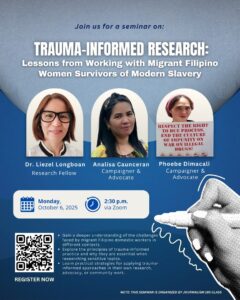Youth called on to campaign vs labor export policy, better jobs in Ph
By : Leia Castro-Margate
“How can we help in the plight of women survivors of domestic employer abuse and human trafficking abroad?” This was the question posited by one of the participants in the webinar on “Trauma-Informed Research: Lessons from Working with Migrant Filipino Women Survivors of Modern Slavery” held last October 6, 2025 with Dr. Liezel Longboan, a researcher fellow from the University of Nottingham, along with domestic workers’ and women’s rights advocates Analisa Caunceran and Phoebe Dimacali.
Longboan, founder of the digital news publication Tinig UK, said of the 2.16 million documented OFWs, 55 percent are women. Around ten thousand Filipina domestic workers (FDWs) arrive in the UK every year from Singapore, Hong Kong, and the Gulf States. Many of them are not paid on time or paid less than what was in their contract, have no rest days, and are abused verbally, physically, emotionally, or sexually. Hearing their stories has led her to pursue the study on the lived experiences of Filipinas who survived abuses from their employers. They want the UK government to review the tied visa system under which most of these abused women are brought to the country by their employers and come up with policies that can protect them from abuses.
Caunceran, a domestic worker who survived abuse from her former employer and appeared before the UK parliament to share her story, said that their experiences will help make people understand the realities of their abuse and lead policy makers to pave the way for change.
The webinar, organized by senior journalism students at the University of the Philippines Baguio, aimed to define trauma-informed practice (TIP) and apply its principles both in research and in journalism. The participants were asked to develop questions for the speakers following the TIP principles of safety, trust and transparency, choice, collaboration, empowerment, and intersectionality.
In answering the question above, Dimacali said that the labor export policy of the government plays a big role in their plight. She said the government must strengthen programs of support for OFWs and hold erring recruitment agencies accountable. She bemoaned the trillions lost in corruption which could have been used to create job opportunities, so OFWs like her did not have to leave the country just to support their families.
“Help us campaign against the labor export policy. That is what you can do,” she advised the young participants. She added that they can also help change the mindset of the government and the elders that going abroad should not be the major solution. ***



